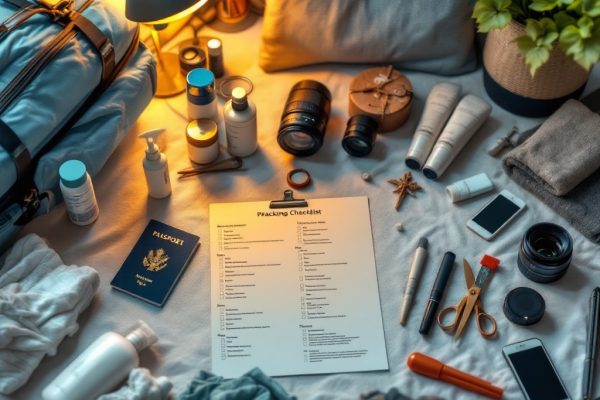From Budgeting to Itinerary Planning: The Ultimate Guide to Traveling with Friends
Dreaming of an unforgettable trip with friends? Traveling with your crew can be a blast, but navigating budgets, itineraries, and personalities requires planning. Discover how to avoid common pitfalls and create a harmonious adventure. Learn about setting clear expectations, managing finances like a pro with budgeting apps, and crafting a relaxed itinerary that balances group fun with personal time. Start planning your dream group getaway today!
Important information

- Open communication about budget, itinerary, and personal preferences is crucial for a successful group trip.
- Establish a clear budget early in the planning process and use budgeting apps or spreadsheets to track expenses transparently.
- Collaboratively create a balanced itinerary that includes both group activities and free time for individual pursuits.
- Be flexible and adaptable to unexpected changes in plans or unforeseen circumstances.
- Choose travel companions with compatible travel styles, interests, and budgets for a more harmonious experience.
Understanding the Basics of Traveling with Friends
Traveling with friends can be an exciting adventure, but it also presents unique challenges. While shared experiences create lasting bonds and unforgettable memories, disagreements are sometimes unavoidable. Conflicts may arise concerning finances, destinations, or planned activities. Careful planning and open communication are essential for a smooth and enjoyable trip. Consider these tips for a successful group trip:
Establish a Budget
Determine a budget early in the planning process. This will help avoid financial disagreements later on, ensuring everyone is comfortable with the overall spending. Consider transportation, accommodation, activities, and meals when setting a budget.
Collaborate on the Itinerary
Involve everyone in the itinerary planning. This ensures everyone’s interests are considered and minimizes the potential for conflict. Discuss must-see destinations and preferred activities to create a balanced itinerary.
Communicate Openly and Honestly
Open communication is crucial for a successful trip. Address any concerns or disagreements promptly and respectfully. Be honest about your preferences and expectations from the outset.
Respect Different Travel Styles
Recognize and respect that everyone has different travel styles. Some prefer a fast-paced itinerary packed with activities, while others prefer a more relaxed approach. Find a balance that accommodates everyone’s preferences.
Plan for Downtime
While group activities are fun, it’s essential to schedule some downtime. This allows individuals to recharge and pursue their own interests, preventing burnout and potential friction.
Embrace Flexibility
Despite careful planning, be prepared for unexpected changes. Flights can be delayed, and weather can disrupt plans. Embrace flexibility and adapt to unforeseen circumstances with a positive attitude.
Why Group Travel Can Be Both Exciting and Challenging
Group travel offers incredible shared experiences and cost savings. However, varying preferences and budgets can sometimes create conflict. Selecting compatible travel companions is crucial for a successful trip.
Look for Compatible Travel Styles
Look for people whose travel styles align with yours. Some thrive on adventurous backpacking, others prefer the comfort of luxury resorts. Openly discussing travel style preferences before booking ensures everyone enjoys the trip.
Discuss Budgets in Advance
Discussing everyone’s budget beforehand will prevent financial disputes later. Transparency about spending expectations helps avoid misunderstandings during the trip.
A well-defined plan makes for smoother sailing.
The Importance of Choosing the Right Travel Companions
Traveling with compatible companions can greatly enhance your trip. When choosing travel partners, consider shared interests, similar budgets, and preferred travel styles. Are you a meticulous planner or a spontaneous adventurer? Open communication is key. Discussing expectations beforehand can prevent misunderstandings and disagreements. Talk openly about desired activities, preferred accommodations, and spending habits. These honest conversations are essential for smoother, more enjoyable group travel.
Choosing Travel Companions
- shared interests,
- similar budgets,
- preferred travel styles.
Open Communication
- Discuss expectations,
- Talk about desired activities,
- Share preferred accommodations and spending habits.
Effective Budgeting for a Group Trip
Planning a successful group trip hinges on open communication, especially about the budget. A well-defined budget ensures everyone understands the costs involved, preventing potential financial hiccups. Your budget should cover all expenses: transportation, lodging, food, activities, and a buffer for unexpected costs.
Simplify Expense Tracking
Leverage shared spreadsheets or budgeting apps like Splitwise or Tricount to simplify expense tracking and individual payments. These tools promote transparency and fairness, minimizing disagreements. Designating someone to manage shared expenses, such as lodging and group meals, further streamlines the process.
Maintain Open Communication
Regularly review expenses together to keep everyone informed and allow for adjustments as needed. Address any financial differences privately and respectfully, acknowledging individual budgetary constraints.
Discuss Budget Openly
Openly communicate about the trip budget to ensure everyone is on the same page regarding expected costs.
Create a Comprehensive Budget
Develop a budget that encompasses all expenses, including transportation, lodging, food, activities, and a cushion for unforeseen costs.
Use Budgeting Tools
Utilize shared spreadsheets or budgeting apps like Splitwise or Tricount to track expenses and simplify individual payments.
Designate a Treasurer
Assign someone to manage shared expenses, such as lodging and group meals, for a more streamlined process.
Review Expenses Regularly
Regularly review expenses as a group to keep everyone informed and make necessary adjustments.
When planning, offer various options for lodging and activities at different price points. This provides valuable context for budget discussions and ensures everyone can comfortably participate. By following these tips, you can create a fun and affordable trip for all.
How to Discuss Budget and Finances Openly
Open communication about finances helps everyone understand each other’s budgetary constraints and ensures a smoother trip. Consider individual needs and preferences to maximize everyone’s enjoyment. If someone is hesitant to discuss finances in a group, offer a private conversation to respect their comfort level.
Why discuss finances?
Open communication about finances helps everyone understand each other’s budgetary constraints, ensuring a smoother trip. Discussing budgetary considerations upfront paves the way for a happy and harmonious vacation.
Respecting individual needs
Consider individual needs and preferences to maximize everyone’s enjoyment. If someone is hesitant to discuss finances in a group, offer a private conversation to respect their comfort level.
Budgetary considerations
Budgetary considerations will vary; some travelers may have tighter constraints.
Travel styles
Travel styles also differ, with some preferring luxury and others opting for budget-friendly choices.
Managing Different Budgets and Spending Styles
Managing travel expenses with friends can be tricky, but proactive planning and open communication are key to a smooth experience. Before embarking on your adventure, have an open discussion about individual budgets and overall spending expectations. This sets the financial groundwork for the trip and ensures everyone is on the same page.
Track and Manage Expenses
- Use budgeting apps or spreadsheets to monitor expenses and individual contributions, simplifying financial organization.
- Assign a treasurer to manage shared costs like accommodation and group meals. This centralizes financial management and provides a clear overview of group spending.
Ensure Transparency and Flexibility
- Regularly discuss and agree on how extra expenses will be covered. This maintains transparency and avoids misunderstandings, especially for spontaneous activities.
- Consider a daily spending limit for shared expenses, but remain flexible to adapt to unexpected situations. Flexibility ensures you can enjoy unforeseen opportunities without financial stress.
With these strategies, you can focus on enjoying your trip rather than worrying about finances.
Utilizing Technology for Expense Tracking
Managing shared expenses on group trips can be challenging. Expense tracking apps offer a solution by monitoring individual and total spending in real-time. Popular choices include Splitwise, Tricount, and Settle Up. These apps simplify splitting costs and promote transparency, ensuring a smoother and more enjoyable group getaway. Consider using one of these apps for your next trip to keep finances clear and everyone happy.
Destination Selection and Planning
Planning a group trip can be challenging, especially when trying to agree on a destination. Start by having each person create a wish list, keeping budget and travel time in mind. Open communication is key, and travel planning apps can be helpful for finding common ground. Be flexible with destinations, as this can often lead to great airfare deals and discovering a surprising place everyone loves. A relaxed itinerary is also important, ensuring there’s something for everyone to enjoy.
Research and Prioritize
Research destinations together, listing must-see attractions, activities, and restaurants. Then, prioritize these by popularity and location to keep everyone engaged. Remember to leave room for spontaneous adventures.
Collaborate and Share
Collaborative planning tools and apps are invaluable, allowing everyone to contribute. Share the itinerary in advance to keep the group informed and gather feedback. This fosters a smoother, more enjoyable trip.
Strategies for Deciding on a Destination
Planning a group trip? Start by gathering everyone’s top 3 to 5 dream destinations. Consider travel time and budget constraints. Open communication is key to finding common ground, and travel planning apps can be invaluable. These apps can compare everyone’s preferences, but remember flexibility is essential. Checking airfare deals helps the group decide and manage costs effectively.
Gather each person’s top 3 to 5 travel destinations.
Keep travel time and budget limitations in mind.
Use travel planning apps to compare preferences.
Check airfare deals to manage costs and reach a consensus.
Using Tools to Find the Best Airfare Deals
Looking for the best flight deals? Use metasearch engines like Skyscanner, Google Flights, and Kayak. These platforms compare prices from various airlines and travel agencies, quickly finding the cheapest options and accommodating flexible dates. For unbelievably low fares, subscribe to Scott’s Cheap Flights. Scott’s sends email alerts for error fares and deep discounts, offering incredibly low prices to exciting destinations. Many platforms also offer price alerts and tracking, helping you monitor fare fluctuations and snag the best deal.
Planning Far in Advance for Cost Savings
Planning your trip in advance can save you money. Booking flights and accommodations early often results in better prices and more choices, which is especially helpful for larger groups. This also helps you lock in favorable rates.
Transportation
Thinking ahead allows you to explore different transportation options. Researching public transit passes, ride-sharing services, or even biking can not only reduce expenses but also minimize last-minute stress and unexpected costs.
Online Tools
Utilize online tools like Google Flights and Skyscanner to monitor price fluctuations and pinpoint the optimal booking time. Budget airlines and exploring alternative airports can also contribute to significant savings on airfare.
Accommodations and Transportation Logistics
Planning your trip involves booking both accommodation and transportation. For accommodation, consider platforms like Airbnb or booking a stay at a traditional hotel. When it comes to transportation, renting a car offers flexibility, while traveling by train is a convenient alternative, especially for certain routes. A helpful tip: prioritize refundable bookings whenever possible to protect yourself against unforeseen changes in your travel plans.
Coordinating Airbnb and Hotel Reservations
Planning a group trip? Start by discussing everyone’s accommodation preferences. A conversation about hotels versus Airbnbs is essential. Where you stay influences your meals and activities. An Airbnb with a kitchen lets you cook, saving money and offering flexibility. A centrally located hotel makes sightseeing easier. Deciding on accommodation early simplifies further planning.
Airbnb
- Offers a kitchen for home-cooked meals, saving money and increasing flexibility.
Hotel
- A central location simplifies sightseeing.
Discuss everyone’s accommodation preferences.
Consider the benefits of an Airbnb with a kitchen for cost savings and flexibility, or a centrally located hotel for easier sightseeing.
Make an accommodation decision early to streamline further planning.
Renting Cars and Buying Train Tickets
Car Rental
Renting a car offers great flexibility for group trips, especially when exploring remote areas or taking scenic drives. Booking in advance is essential, especially during peak seasons, to secure your desired vehicle and potentially get lower rates. Consider factors like the number of passengers, luggage space, and insurance coverage when choosing a car.
Train Travel
Booking train tickets online often provides better prices and secures your seat, especially on popular routes or during holidays. If you plan on multiple train journeys, a rail pass could save you money. Compare prices, schedules, and different train operators to find the best deals.
Booking Refundable Options to Avoid Financial Loss
Booking refundable travel options minimizes your financial risk from unexpected disruptions. While they may cost a bit more upfront, refundable bookings offer invaluable flexibility, protecting your investment should your plans change. Ensure everyone traveling understands the terms and conditions, including cancellation deadlines and potential partial refunds, to maximize the benefits.
Communication and Group Dynamics
Planning a group trip? Setting clear expectations and boundaries is key for a smooth and enjoyable experience. Openly discuss everyone’s travel preferences, concerns, and individual styles beforehand. A pre-trip meeting can proactively address potential issues like punctuality, budget, and preferred activities.Flexibility is essential during the trip. Foster open communication, make collaborative decisions, and respect everyone’s input through voting or consensus. Personal time is crucial, even in a group setting. Allow for individual space to avoid the stress of constant togetherness, which can strain relationships.Financial transparency is paramount. Openly discuss money matters to prevent stress. Agree on a budget beforehand, track expenses transparently using budgeting apps or shared spreadsheets, and respect everyone’s financial comfort levels, acknowledging that spending priorities can differ.
Benefits of using travel apps:
- Simplified coordination and communication.
- Easy sharing of itineraries, important documents, and real-time locations.
- Streamlined communication and on-the-go decision-making through in-app messaging features.
Using travel apps minimizes:
- Coordination hassles.
- Confusion about schedules and documents.
- Misunderstandings and delays in decision-making.
Setting Expectations and Boundaries
Discuss personal preferences upfront. Communicate about personal space, dietary needs, and desired activity levels to prevent misunderstandings.
Align expectations before traveling. Discuss nightlife, free time, and group activities to ensure a smoother experience.
Define boundaries clearly. Openly discuss expenses, shared responsibilities, and decision-making processes to minimize potential conflicts.
Handling Financial Discussions and Avoiding Stress
Open communication about finances is crucial for enjoyable group trips. Before embarking on a trip, discuss individual budgets and spending comfort levels. Then, create a shared budget that includes transportation, accommodation, meals, activities, and a contingency fund for unexpected expenses. This allows everyone to plan accordingly.
Openly communicate about finances. Discussing individual budgets and spending preferences beforehand ensures everyone is on the same page.
Create a shared budget. Include transportation, accommodation, meals, activities, and a contingency fund for unexpected costs.
Use expense-tracking apps. These apps promote transparency, simplify cost-splitting, and keep everyone informed about shared expenses.
Using Travel Apps for Coordination and Communication
Travel apps simplify group trips by streamlining planning and communication. Features like shared itineraries, real-time location updates, and in-app messaging keep everyone connected and informed. These apps also centralize bookings for flights, accommodations, and activities, making the entire process easier. Managing expenses can be tricky, but apps like Tricount or Splitwise simplify tracking and splitting costs, ensuring fair and transparent expense sharing. They allow you to easily divide expenses and settle up with your travel companions.
Benefits of Using Travel Apps for Group Trips
- Streamlined planning and communication.
- Shared itineraries and real-time updates.
- Centralized bookings for flights, accommodations, and activities.
- Simplified expense tracking and splitting.
Recommended Apps
- Tricount
- Splitwise
Crafting a Relaxed Itinerary
Planning a group trip requires careful consideration of everyone’s interests and needs. Prioritize popular attractions but factor in travel time between destinations. Allocate enough time for each activity, balancing sightseeing, relaxation, and adventure. Consider offering optional activities to cater to diverse interests.
Avoid Burnout
Scheduling downtime is crucial to prevent burnout. Incorporate free time for personal pursuits. This allows individuals to recharge and pursue their own interests.
Balance Group Time and Independent Exploration
Designated group gatherings foster bonding and shared experiences. Balance this with opportunities for independent exploration, allowing for personal discovery and reflection.
Consider everyone’s needs and preferences, including accessibility. Provide alternative activities for those unable to participate in specific excursions due to physical limitations or other preferences. Open communication is essential. Addressing concerns and ensuring everyone’s comfort contributes to a positive group experience.
Balancing Group Activities and Personal Interests
Planning an unforgettable group trip involves finding the right mix of shared experiences and individual freedom. Start by discussing everyone’s interests to create an itinerary that caters to different preferences. While planning exciting activities, avoid over-scheduling. Leave room for spontaneous discoveries, like finding a hidden local gem, or simply relaxing. This flexibility also provides a buffer for unexpected travel delays. A well-structured trip offers a balance of planned activities and free time, allowing for both shared experiences and personal exploration. Consider these tips for a smooth and enjoyable group travel experience:
Initiate discussions about everyone’s interests. Early communication ensures the itinerary considers diverse preferences and expectations.
Craft a balanced itinerary. Plan engaging activities but avoid over-scheduling, allowing flexibility for spontaneous adventures and relaxation.
Embrace spontaneity. Leave room for unplanned discoveries, whether it’s a local market, a cozy cafe, or simply enjoying the scenery.
Factor in buffer time. Unexpected travel delays can occur, so incorporate extra time to prevent disruptions to planned activities.
Allowing Time for Personal Space and Alone Time
A great trip combines shared experiences with personal time. Respecting individual needs for relaxation and solo exploration is crucial.
Communicating your desire for some alone time early on, perhaps during the planning stages, helps set expectations.
Agreeing on a schedule that balances group activities with individual pursuits creates harmony and maximizes everyone’s enjoyment.
This balanced approach strengthens group bonds and makes the trip more rewarding for all.
Ensuring Inclusivity and Comfort for All
When planning activities, consider everyone’s interests and ensure everyone can participate, keeping accessibility in mind.
Dining is crucial; accommodate dietary restrictions and respect individual food preferences.
Schedule downtime for rest and relaxation, as energy levels vary.
Open communication and flexibility are essential for a comfortable and inclusive experience.













